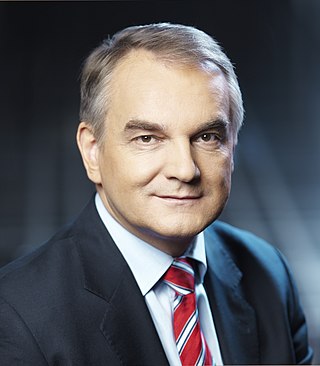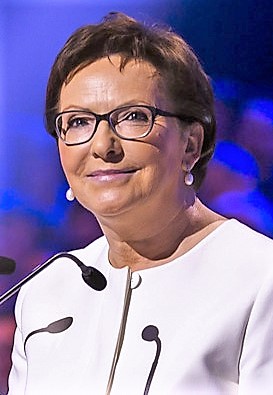
The president of Poland, officially the president of the Republic of Poland, is the head of state of Poland. Their rights and obligations are determined in the Constitution of Poland. The president heads the executive branch. In addition, the president has the right to dissolve parliament in certain cases, can veto legislation and represents Poland in the international arena.

Law and Justice is a right-wing populist and national-conservative political party in Poland. Its chairman is Jarosław Kaczyński. Often considered to be a Christian nationalist party, the party is widely seen by political scientists, historians, and the general public as being the de facto political proxy of the Polish Catholic Church. It has attracted widespread international criticism and domestic protest movements by dismantling liberal-democratic checks and balances.

Kazimierz Władysław Bartel was a Polish mathematician, freemason, scholar, diplomat and politician who served as 15th, 17th and 19th Prime Minister of Poland three times between 1926 and 1930 and the Senator of Poland from 1937 until the outbreak of World War II.

Waldemar Pawlak is a Polish politician. He has twice served as Prime Minister of Poland, briefly in 1992 and again from 1993 to 1995. From November 2007 to November 2012 he served as Deputy Prime Minister and the Minister of Economy. Pawlak is the only person who held the office of prime minister twice during the Third Republic, and he remains Poland's youngest prime minister to date.

Count Roman Ignacy Potocki, generally known as Ignacy Potocki, was a Polish nobleman, member of the influential magnate Potocki family, owner of Klementowice and Olesin, a politician, writer, and office holder. He was the Marshal of the Permanent Council in 1778–1782, Grand Clerk of Lithuania from 1773, Court Marshal of Lithuania from 1783, Grand Marshal of Lithuania from 16 April 1791 to 1794.
The Nonpartisan Bloc for Cooperation with the Government was a "non-political" organization in the interwar Second Polish Republic, in 1928–35. It was closely affiliated with Józef Piłsudski and his Sanation movement. Its major activists included Walery Sławek, Kazimierz Bartel, Kazimierz Świtalski, Aleksander Prystor, Józef Beck, Janusz Jędrzejewicz, Wacław Jędrzejewicz, Adam Koc, Leon Kozłowski, Ignacy Matuszewski, Bogusław Miedziński, Bronisław Pieracki, Adam Skwarczyński, and Janusz Franciszek Radziwiłł.
Poland has a multi-party political system. On the national level, Poland elects the head of state – the president – and a legislature. There are also various local elections, referendums and elections to the European Parliament.

Parliamentary elections were held in Poland on 25 September 2005. Thirty million voters were eligible to vote for all 460 members of the lower house, the Sejm and all 100 members of the upper house, the Senate.

Parliamentary elections were held in Poland on 23 September 2001 to elect deputies to both houses of the National Assembly. The election concluded with an overwhelming victory for the centre-left Democratic Left Alliance – Labor Union, the electoral coalition between the Democratic Left Alliance (SLD) and the Labour Union (UP), which captured 41% of the vote in the crucial lower house Sejm. The 2001 election is recognized as marking the emergence of both Civic Platform (PO) and Law and Justice (PiS) as players in Polish politics, while also witnessing the outright collapse of the Solidarity Electoral Action (AWS) and its former coalition partner, the Freedom Union (UW).

The parliament of Poland is the bicameral legislature of Poland. It is composed of an upper house and a lower house. Both houses are accommodated in the Sejm and Senate Complex in Warsaw. The Constitution of Poland does not refer to the Parliament as a body, but only to the Sejm and Senate.

Ewa Bożena Kopacz is a Polish politician who has served as a Vice-President of the European Parliament since 2019. She previously was Marshal of the Sejm from 2011 to 2014, the first woman to hold the office, as well as Prime Minister of Poland from 2014 to 2015. In addition, Kopacz was Minister of Health from 2007 until 2011. Since 2001, she has been a member of Civic Platform, which she chaired from 2014 to 2016. Kopacz succeeded Donald Tusk as Prime Minister, becoming the second woman to hold the office after Hanna Suchocka (1992–1993). Her term as Prime Minister ended on 16 November 2015, when she was succeeded by Beata Szydło.

Grzegorz Juliusz Schetyna is a Polish politician who has been Leader of Civic Platform and Leader of the Opposition from 26 January 2016 to 25 January 2020. He has served as Minister of Foreign Affairs of Poland from 2014 to 2015, Marshal of the Sejm from 2010 to 2011, Acting President of Poland 2010, Deputy Prime Minister of Poland from 2007 to 2009 and Minister of the Interior and Administration 2007 to 2009. He has been a Member of the Sejm from 1997.
A Piłsudskiite was a political supporter of Marshal Józef Piłsudski, the founder of the First World War Polish Legions and the first Chief of State of the Second Republic of Poland. The Piłsudskiites had a major influence on the politics of Poland during the interwar period (1918–1939).

Związek Ludowo-Narodowy was a Polish political party aligned with the National Democracy political movement during the Second Polish Republic, gathering together right-wing politicians with conservative and nationalist opinions.

Poland Together, formally Poland Together United Right, was a conservative-liberal political party in Poland. The party was founded on 7 December 2013 by former Minister of Justice and Civic Platform member Jarosław Gowin and members of centre-right political parties Poland Comes First and Conservative People's Party.

Parliamentary elections to both the Sejm and Senate were held in Poland on 25 October 2015 for the eighth term of the Sejm of the Republic of Poland, which ran from 12 November 2015 until 2019.

Parliamentary elections were held in Poland on 13 October 2019. All 460 members of the Sejm and 100 senators of the Senate were elected. The ruling Law and Justice (PiS) retained its majority in the Sejm, but lost its majority in the Senate to the opposition. With 43.6% of the popular vote, Law and Justice received the highest vote share by any party since Poland returned to democracy in 1989. The turnout was the highest for a parliamentary election since the first free elections after the fall of communism in 1989. For the first time after 1989, the ruling party controls one house, and the opposition the other.
The United Right is a conservative political alliance in Poland. It came to power following the 2015 parliamentary election.

The 2023 Polish parliamentary election took place on Sunday, 15 October 2023, as per the Polish Constitution. Seats in both the Sejm and Senate were contested. Alongside the elections, a referendum containing four questions concerning economic and immigration policy of the government was held.
Presidential elections will be held in Poland in 2025. They can be held earlier, should the office become vacated as a result of death, resignation or removal from office of the incumbent. Due to constitutional term limits allowing a president to serve only two terms, incumbent president Andrzej Duda is ineligible for re-election.















